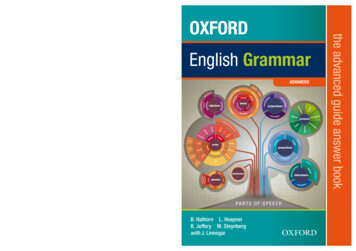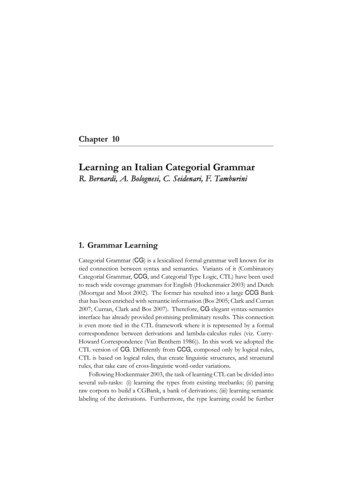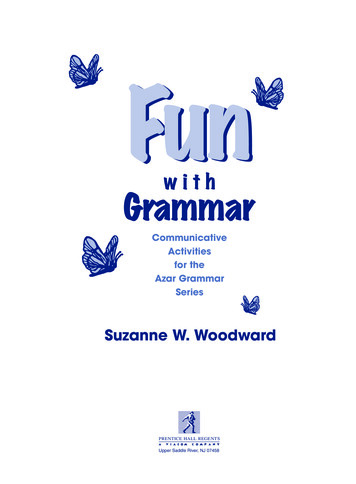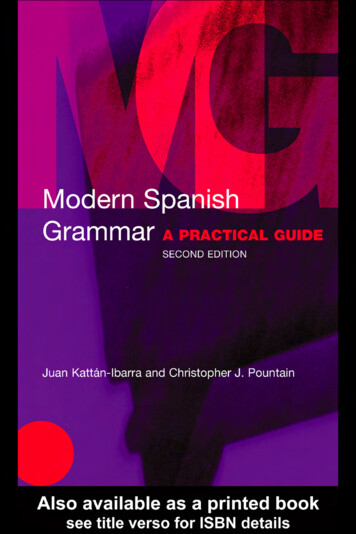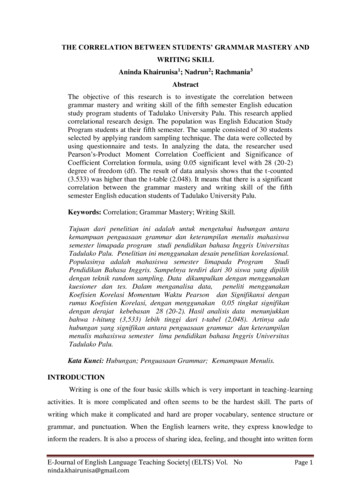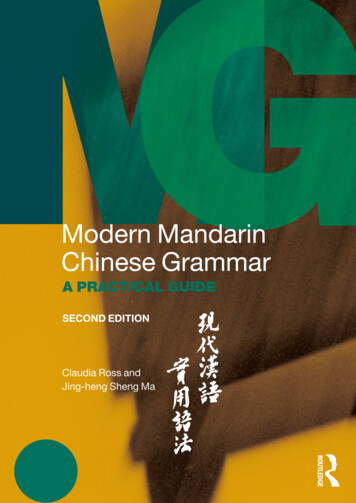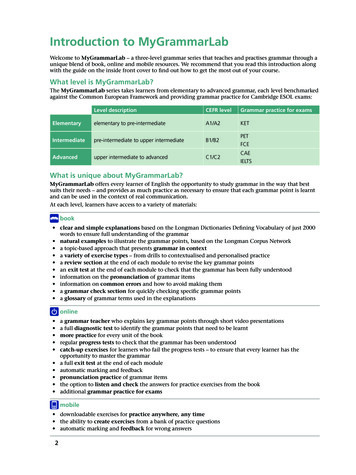
Transcription
English GrammarFor Bible Students“'Like young plants, young brains need wateringand it is the duty of Grammar to undertake this.”By Benjamin J. Williams0
This little set of notes on English grammar isDedicated to my treasure above rubies, my wife,Charmion Selene Williams,Who crosses my i’s and dots my t’s.1
Table of ContentsIntroductionI.Parts of SpeechII.The Simple I. AdverbsVIII. II. Clauses, Compound & ComplexXIII. Conjunctions & LogicXIV. PunctuationXV. Literal & Figurative LanguageXVI. Rules for Writing2
INTRODUCTIONWhy Should the Bible Student Know English Grammar?The reasons for a study of this type are many, but three simple reasons will be given here.First, the Bible claims to be the inspired word of God (II Tim. 3:16). This expression means thatthe Scriptures claim to be “God breathed”, and the Bible often makes this claim for even thewords of the text (II Sam. 23:2 “The Spirit of the LORD spake by me, and his word was in mytongue.”). Inspired writers often use the grammar of the Scriptures to make doctrinal arguments.Our Lord appealed to the tense of a verb to prove the resurrection, pointing out that God says “Iam” Abraham’s God as opposed to “I was” (Matt. 22:32). Paul makes a doctrinal pointconcerning the promise of the Messiah by pointing to the number of the noun “seed” as beingsingular and not plural (Gal. 3:16). This implies that a better understanding of grammar wouldallow a better understanding of the Bible.Second, the Bible was originally written in languages other than English. To properly learnthese languages, one must first be a master of the native tongue. When studying Greek, one willoften be asked to translate sentences in and out of English. Without a functional knowledge ofEnglish, many fail in these exercises. Furthermore, in order to discern whether or not theoriginal language has been correctly translated by the multitudes of available versions, one mustunderstand the usage and senses of English grammar in addition to simple definitions. Is thefuture perfect verb “shall have been bound” a better rendering than the simple future “shall bebound” in Matt. 16:19? Who can say without first knowing the difference in the two verb tenses!In any language, the rules of grammar mean as much or more to a sentence than the definitionsof the individual words.Third, the Christian is often in a situation where his selection of words, either on the writtenpage or in oral speech, determines whether or not some lost soul comprehends the Gospel. Somewill claim that we are saved by “faith only”, which implies that grace, blood, love, andrepentance are unnecessary. What they probably mean is that we are saved “only by faith”,which implies that faith is essential while not excluding the other essentials. For this reason, it isprudent to learn how to carefully and properly construct sentences and complete thoughts.Tools for Grammar Study and ImprovementI hope that this text will be a resource and a launching pad for an improvement of yourgrammar. However, this text is by no means a comprehensive grammar book, as this bookassumes a working knowledge of English. For that matter, even an exhaustive grammar book isinsufficient for complete mastery of the English language. The following resources would be anaide in your continuing growth in the English tongue.1. A comprehensive grammar book. Like any language, English is filled with subtle,tricky, deceptive rules that can completely change the meaning of a text. BecauseEnglish is a bubbling stew of rules and words from other languages, both of Romantic3
and Germanic origin, it is especially full of exceptions and verbal cul-de-sacs.complete, comprehensive grammar book will fill in the holes left by this text.A2. An unabridged dictionary. While the rules of grammar have more control over asentence than the definitions of the individual words, the words are still the substance ofany sentence. An expansive vocabulary keeps communication precise, stimulates sleepyaudiences, and prevents misunderstandings. A good unabridged dictionary will providethe etymology of a word and its meanings in various eras. This is especially important ifyou are using a version of the Bible like the American Standard Version (1901 styleEnglish) or the King James Version (1611-1769 style English). For example, knowingthat the words “perfect” and “conversation” have changed meanings over the years willgreatly improve your study of the King James Version.3. Stimulating reading materials. The best way to keep your grammar skills andvocabulary keen is to read. Obviously, a scholarly journal will do more for you than acomic book. Fortunately, the Bible student with a reliable version already has an interestin a classic text of the English language. Nothing has contributed to my personalunderstanding of the English language more than my studies in the King James Bible, thefinest piece of English literature in existence. More modern versions lack some of theeloquence and style of the older classics, so if you are trying to read to improve yourvocabulary and grammar, be careful what you choose to read.4. Vocabulary builders. If you have had a love of reading from an early age, you have agreat head start above others. If not, you may need a good vocabulary builder to catchup. Several such books flood the market every year and most are relatively inexpensive.Generally they consist of a word-a-day type format.5. Guide to English Usage. Many of the books in the grammar section of a bookstoreactually deal more with usage than grammar, as we will discuss it. “Usage” deals withthe distinction between commonly confused words and common grammar mistakes. Abook on this subject can be helpful to your written and oral communication. However,since the Bible doesn’t contain grammar errors, this course will not deal with that in anydetail.DisclaimerI feel compelled to inform you that I am only an amateur English teacher. I have had goodtraining in the English language thanks to a pair of highly critical and helpful high schoolteachers. I should also acknowledge that my understanding of the usefulness of grammar inBible study was built up by several preachers who are very dear to me. However, this does notmake me an expert. If you find grammar mistakes in this text (I try to always split a fewinfinitives and leave a few participles dangling!) or conflicts with other grammar texts, I am mostlikely in the wrong.4
As an anecdotal explanation of my grammatical expertise or lack thereof, allow me to relate ashort story. In high school, I was often selected to attend scholastic competitions, often tocompete against other students by taking tests. On one such occasion, I was chosen to representmy school in the grammar part of the competition. I was given a blank answer form and a test.To my credit, I took first place in the competition. To my shame, I misspelled the word“grammar” as “gramar” on the subject line of the answer form.FormatI originally formatted this text using concise numbered rules. However, with each revision,my numbered rules have become numbered paragraphs. Interspersed throughout the text areexample tables. The example sentences are numbered and then referenced in the lesson. Also,to encourage application of this material, I have included some application sections, indicated bythe little Bible symbol, where the student is encouraged to apply the current concept to a passageof Scripture.At the end of the lesson is a brief exercise that will normally ask you to open your Bible andthink about English grammar at the same time. This can be a chore if this is the first attempt thatyou have made in this kind of studying, but it is well worth the effort.In addition, because this text is aimed in part toward those interested in studying Biblelanguages like Greek, I will occasionally stop and make comments that compare Greek andEnglish. If you have no interest in Greek, then you may have little interest in these comments.SourcesMy primary source for grammar rules in this text is Harvey’s Revised English Grammar. Itsfirst copyright was in 1878, while my edition is copyrighted 1986. It is subtitled A PracticalGrammar of the English Language. I prefer the concise old primers for my purposes.All Bible quotations will come out of the King James Bible of which I am a huge fan. Otherreliable translations exist, but none with the depth of style of the KJV. Furthermore, I taketheological issue with some of the modern speech translations but that would be the subject ofanother book entirely! Suffice it to say that I chose the KJV for this text for the reasons alreadystated – scholarly journal instead of comic book.Helpful VocabularySometimes we will have to split hairs as we discuss grammar. It will be helpful for me todefine a few words up front.Linguistics is the science of languages. It is not a field specific to any one language, butinstead is universal to all.Syntax is the structure of terms in a line. This term is used in computer programming andgrammar as well. It relates to order more than meaning.5
Grammar is the specific set of rules that governs a language. The rules make it possible tosafely communicate an idea.Usage is the study of specific words and how they should or should not be used in alanguage. For example, “to”, “two”, and “too” are studied under usage. We will not deal lotwith this subject in this class.Spelling relates to the formation of an individual word. We will not cover this much in thisclass either.6
I. PARTS OF SPEECHThe following is intended to be a list, not so much a lesson. Entire lessons will be devoted to theterms below later in this book. For now, just read and learn the terms. If you finish and feel alittle confused, just be patient!1. The English language divides its words into nine classes: noun, adjective, pronoun, verb,verbal, adverb, preposition, conjunction, interjection. This section will give an overview of theclasses, but a detailed study will be left for later in the text. It should be noted that thisclassification is somewhat arbitrary. Some texts will arrange things differently, but this list willat least give you the general idea.2. A noun names some entity, such as person, place, or thing. A noun in this sense is merely aname, whether specific or common. Examples: Bartholomew, Bethlehem, baptistery.3. An adjective modifies a noun or pronoun. By modify, I mean that the adjective describes ordistinguishes the noun or pronoun it modifies. For instance, the noun “car” includes all that fallsunder the classification “car”. However, “fast car”, where the adjective “fast” modifies the noun“car”, limits the noun under consideration to just those cars that are fast. Examples: tall, small,red.4. A pronoun replaces a noun, usually for convenience sake. Rather than repeat the noun,“establishmentarianism”, in every related sentence, one could simply insert the pronoun “it” inthe place of the noun. Examples: he, she, it.5. A verb expresses action. The action does not have to be physical or even pertain to motion.A verb can describe spiritual or mental processes. Verbs can also express being or state, as withthe verb “is”. Example: be, hit, repent.6. A verbal is a word that comes from a verb, but it has the properties of another part of speech.The three kinds of verbals are gerunds, infinitives, and participles. A gerund acts as a noun. Aninfinitive acts somewhat like a noun as well. However, the participle is a modifier relates anaction to whatever word it modifies. For instance, I can show that a person wrote his lesson afterstudying hard by saying, “Having studied hard, he wrote the lesson.” Here the participle,“having”, shows a completed action on the part of the noun prior to the main verb. Examples:singing, having, dangling.7. An adverb modifies a verb, adjective, or another adverb. As with the adjective modifier, theadverb describes or distinguishes a word that it modifies. The adverb often describes how athing is. Example: very, happily, often.8. A preposition shows a relationship between the preposition’s object and something else.They can show location, time, means, or nature. Example: in, after, by, of.7
9. A conjunction is used to connect thoughts together. It can be used in a variety of ways.Conjunctions often have a definite logic value in the Bible that will be discussed later in this text.Example: and, or, but.10. An interjection expresses emotion. They are rarely used in formal writing, though areprevalent in dialogues. They often come with exclamation marks. This is the only part ofspeech that will not be discussed further in this text. Example: oh, ah, alas.8
Exercise I: Parts of SpeechInstructions:Take a shot at identifying to which parts of speech the following words belong. If you don’t dotoo well, don’t fret! This is just an introductory quiz. More will be said about the parts ofspeech as we go.Bonus: If the word could be more than one part of speech depending on context, put that answerdown as well.1. adversary2. deity3. holy4. holily5. or6. alas7. ye8. unto9. sing10. singingInstructions:Find the parts of speech in Bible verses. Site the verse below and list the word. One verse foreach part of speech will suffice. Don’t make it harder than it tionConjunctionInterjection9
II. THE SIMPLE SENTENCEElements of Syntax1. The simple sentence is the smallest complete unit of English words. Anything less than acomplete, simple sentence will fail to coherently communicate a complete thought. For example,“preachers singers” or “speak sing” fail to communicate a complete thought, whereas “preachersspeak” and “singers sing” are proper simple sentences and communicate a complete thought.2. The simple sentence is composed of two parts. In this context, the subject of a sentencenames what the
I should also acknowledge that my understanding of the usefulness of grammar in Bible study was built up by several preachers who are very dear to me. However, this does not make me an expert. If you find grammar mistakes in this text (I try to always split a few infinitives and leave a few participles dangling!) or conflicts with other grammar texts, I am most likely in the wrong. 5 As an .
